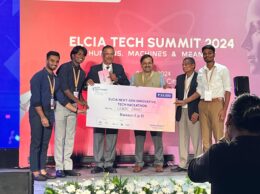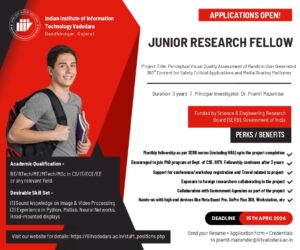Bengaluru: A team from Indian Institute Management (IIM) Bangalore named ‘The Eradicators’ comprising four students from the 2015-17 Post Graduate Programme (PGP) batch, under the mentorship of Dr. Arnab Mukherji, Chairperson, Center for Public Policy, have made it to the finals of the 2016 Global Business Challenge. The team will battle with 5 other teams in the finals in Brisbane, Australia from 29 October to 3 November 2016.
The 2016 Global Business Challenge (2016GBC) is a graduate business case competition where contestants design sustainable solutions for global problems. The first stage invited applications from over 45 universities across the world. The submissions required teams to design a scalable, economical solution – define the concept and substantiate the idea with potential alliances, technology needed and the preliminary financial budgeting. Team Eradicators proposed the solution that leveraged new and existing technologies, and sought to gain collaborations with start-ups as well as vetted experts aiming to solve diverse problems in the healthcare space. Thus, they aim to deliver high-impact solutions by making healthcare accessible and affordable to backward and isolated communities in various parts of both the developed as well as the developing world.
The four PGP students from IIMB’s team hail from diverse backgrounds. Deepesh Gupta pursued Engineering Physics from IIT Delhi, and has four years of experience in Pharmaceuticals Consulting. Kanika Bansal is an Instrumentation Engineer from IIT Kharagpur. Priyanka Bagai is from Shri Ram College of Commerce (SRCC) and comes with three years of experience in International Strategic Consulting while Priya Jindal, also a Commerce graduate from SRCC, is the tech-enthusiast in the group having played the role of a Product Manager at Groupon.
The team mentor, Dr. Arnab Mukherji, is an applied micro-economist whose earlier work focused on the economics of healthcare and governance with a focus on India, and his work has been published in several peer-reviewed journals and as book chapters.
Explaining what helped them develop their solution for the competition, Deepesh says, “Arnab sir’s past work and collaboration were instrumental in formulating our solution. Our initial solution was guided by an Indian context. For the finals, we strive to push the solution further to make it truly universal and replicable”. Another team member Kanika comments, “The most challenging aspect was to create a business model around a social cause. The idea had to be sustainable”. What excited Priyanka was the prospect of designing and delivering a solution that might actually be scaled up to be implemented at an international level. Priya believes that working with members from diverse backgrounds helped them deliberate and discuss the same problem from various angles, which helped make the final solution more robust.
Conducted as a partnership between Queensland University of Technology, the University of Queensland and Griffith University and with the support of government and industry, the competition invites implementable and practical solutions for some of the biggest contemporary problems across the globe. The ultimate objective is to scale up and implement the solution for which the winning team is awarded $325,000 in prizes and the opportunity to work under the mentorship of industry experts and leaders. The 2016 Global Business Challenge is the first and largest competition of its kind in the world and its partners have committed to host the event for an initial seven-year period.
Six teams have been selected for the finals to be held in Brisbane from October 29 to November 3, 2016.
The following teams were judged as the winners of their respective pools and have subsequently been confirmed as Finalists for the 2016 Global Business Challenge:
Pool 1: Team “Smart Toilet Company” : Queensland University of Technology (Australia);
Pool 2: Team “InnovationX” : University of Melbourne, Melbourne Business School (Australia)
Pool 3: Team “Edge Consulting” : Memorial University (Canada)
Pool 4: Team “Medfix” : Heinrich Heine University Düsseldorf (Germany)
Pool 5: Team “Omnicare” : University of Calgary (Canada)
Pool 6: Team “The Eradicators” : Indian Institute of Management Bangalore (India)
Wildcard: Team “Durian Exchange” : University of Exeter, University of Southampton, SOAS University of London (UK) & Chulalongkorn University College of Public Health Sciences (Thailand) The teams will be in a lock-in to solve a problem, more specific to isolated communities in Queensland.






